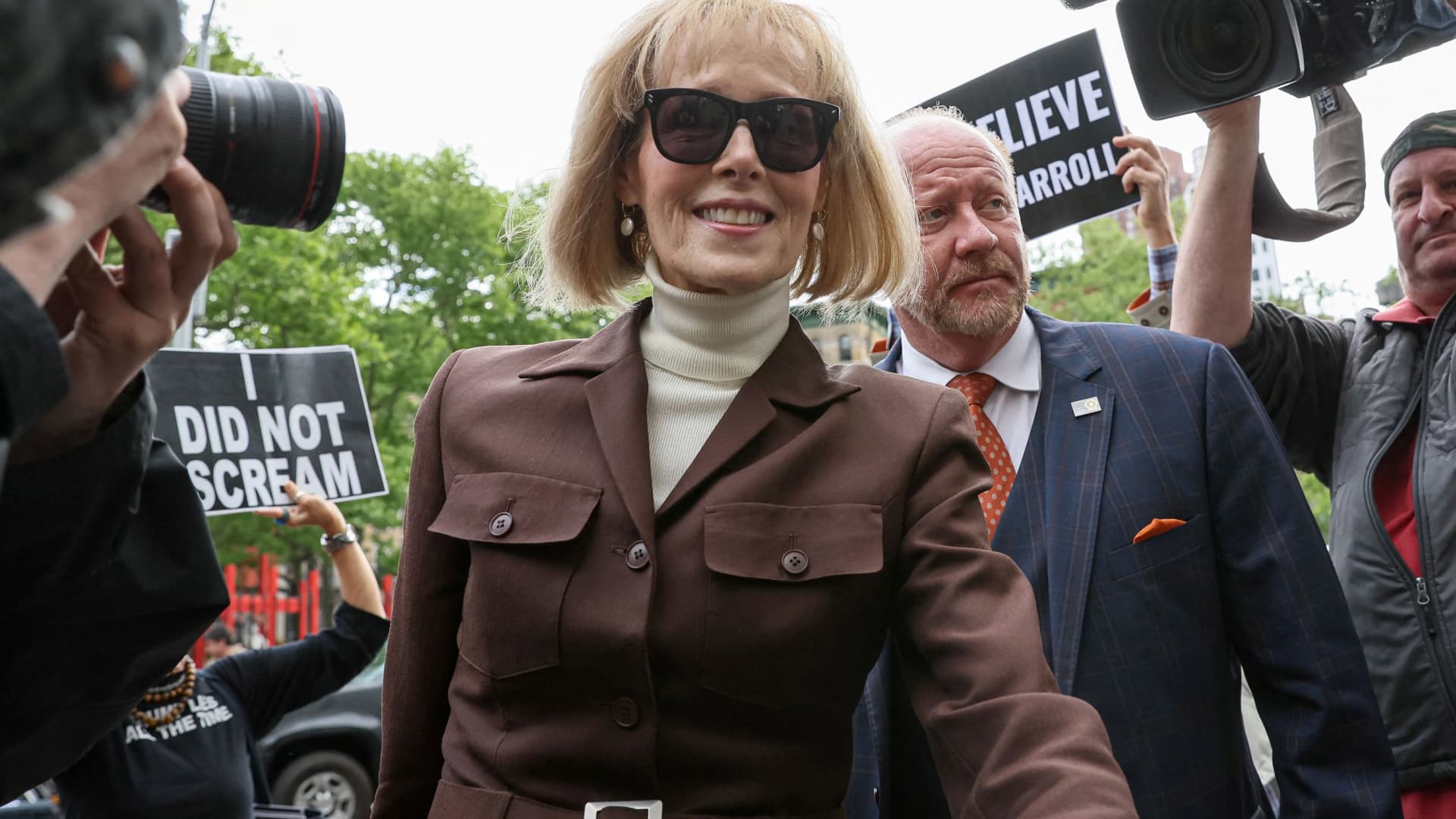Trump suffers big loss in E. Jean Carroll defamation case, judge says he’s liable


E. Jean Carroll, who accused former President Donald Trump of rape, arrives at Manhattan Federal Court for the continuation of the civil case, in New York City, May 9, 2023.
Brendan McDermid | Reuters
A federal judge on Wednesday ruled that Donald Trump is civilly liable for defamatory statements he made about writer E. Jean Carroll in 2019 when she went public with claims he had raped her decades earlier.
Judge Lewis Kaplan, as part of that ruling, said the upcoming trial for Carroll’s lawsuit against Trump will only deal with the question of how much the former president should pay her in monetary damages for defaming her.
Normally, a jury would determine at trial whether a defendant is liable for civil damages claimed by a plaintiff.
But Kaplan found that Carroll was entitled to a partial summary judgment on the question of Trump’s liability in the case.
He cited the fact that jurors at a trial in a separate but related lawsuit in May found that Trump sexually abused Carroll in a New York department store in the mid-1990s, and defamed her in statements he made when he denied her allegation last fall.
Carroll’s lawyers argued, and Kaplan agreed, that the jury’s verdict in that case effectively settled the legal question of whether Trump had defamed her in similar comments he made about Carroll in 2019.
“The truth or falsity of Mr. Trump’s 2019 statements therefore depends — like the truth or falsity of his 2022 statement — on whether Ms. Carroll lied about Mr. Trump sexually assaulting her,” Kaplan wrote in his 25-page decision in U.S. District Court in Manhattan.
“The jury’s finding that she did not therefore is binding in this case and precludes Mr. Trump from contesting the falsity of his 2019 statements,” Kaplan wrote.
The ruling is the latest in a series of big losses for Trump in lawsuits filed by Carroll.
At the trial that ended in May, Trump was ordered to pay Carroll $5 million in damages for the comments he made after he was president. Trump is appealing the verdict and damages in that case.
The suit that was the subject of Kaplan’s ruling Wednesday relates to statements about Carroll that Trump made when he was president as he denied her claim of rape.
Trial in that case is set to begin Jan. 15, just as the Republican presidential nomination contest is set to heat up with primaries and caucuses. Trump is the front-runner in the contest for the 2024 GOP nomination.
Carroll’s lawyer, Roberta Kaplan, who is not related to the judge, in a statement, said, “We look forward to trial limited to damages for the original defamatory statements Donald Trump made about our client E Jean Carroll in 2019.”
Trump’s lawyer, Alina Habba, said, “We remain very confident that the Carroll II verdict will be overturned on appeal which will render this decision moot.”
“Carroll II” is the shorthand name for Carroll’s second lawsuit, which was the subject of the trial that ended in May.
Habba said she believes that a federal appeals court in New York will block the upcoming trial in Carroll’s first lawsuit from starting as scheduled “as it considers the meritorious defenses that have been raised by President Trump.”
Trump is appealing Judge Kaplan’s dismissal of his own claim that Carroll defamed the former president when she reiterated her claim that Trump had raped her. Trump’s argument is based on the fact that jurors at the trial in May had not found that he raped Carroll, but had instead sexually abused her.
Judge Kaplan, in an August ruling, brushed aside Trump’s argument, saying that the jury’s finding that Trump had “deliberately and forcibly” penetrated Carroll is consistent with the common use of the term rape, if not the technical definition under New York law.
A month earlier, the Department of Justice dropped its nearly three-year-long effort to shield Trump from civil liability in the suit related to comments he made about Carroll as president. The DOJ had argued that Trump was acting within the scope of his office as president when he made the statements about Carroll.
In dropping that argument, the DOJ cited a decision by the federal appeals court in Washington, D.C., which suggested Trump could be personally sued if his statements did not have the purpose of serving the U.S. government.
The department also noted that Trump’s allegedly defamatory statements about Carroll continued after he left the White House in early 2021 and that those statements are included in an amended suit Carroll filed against him last month.









